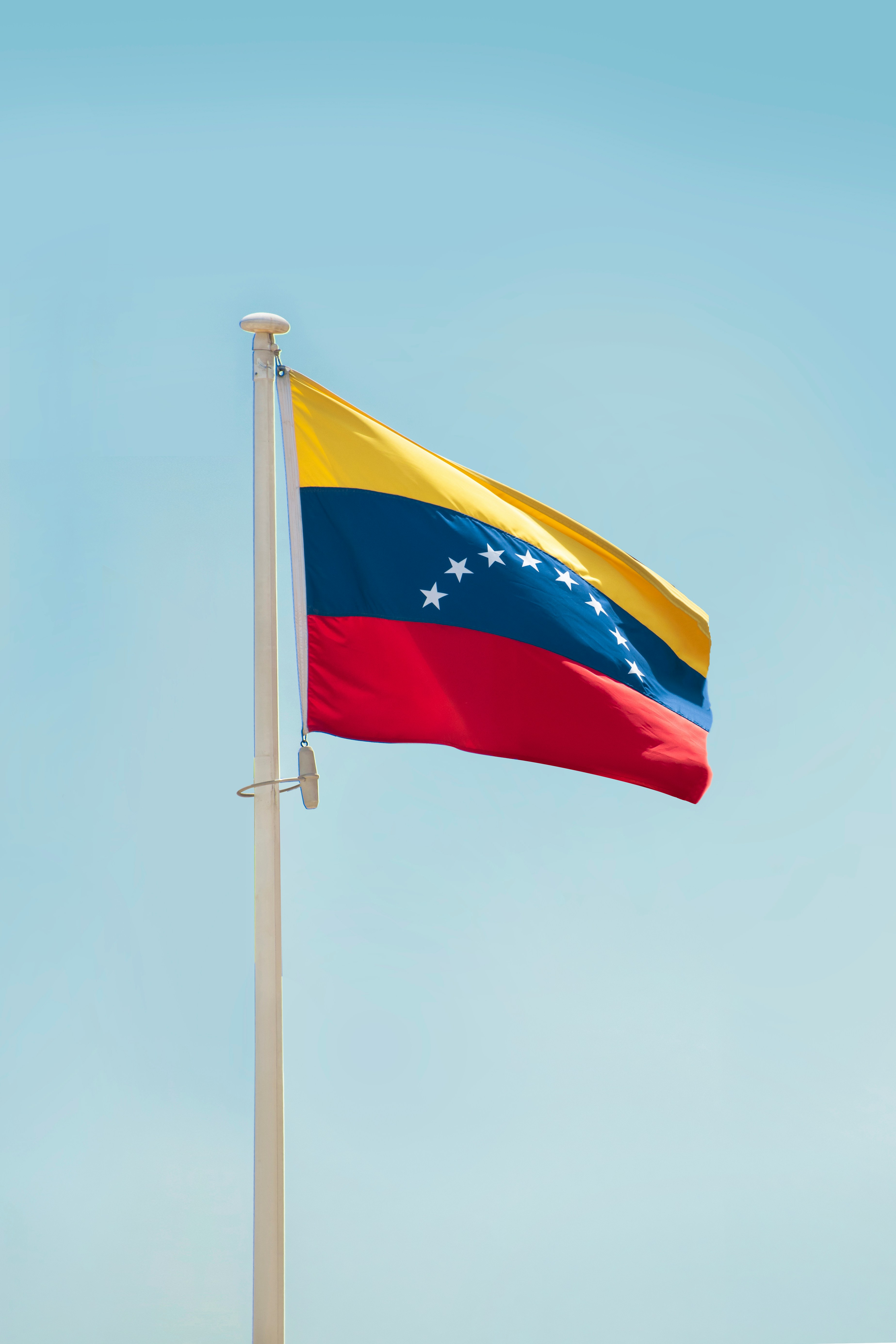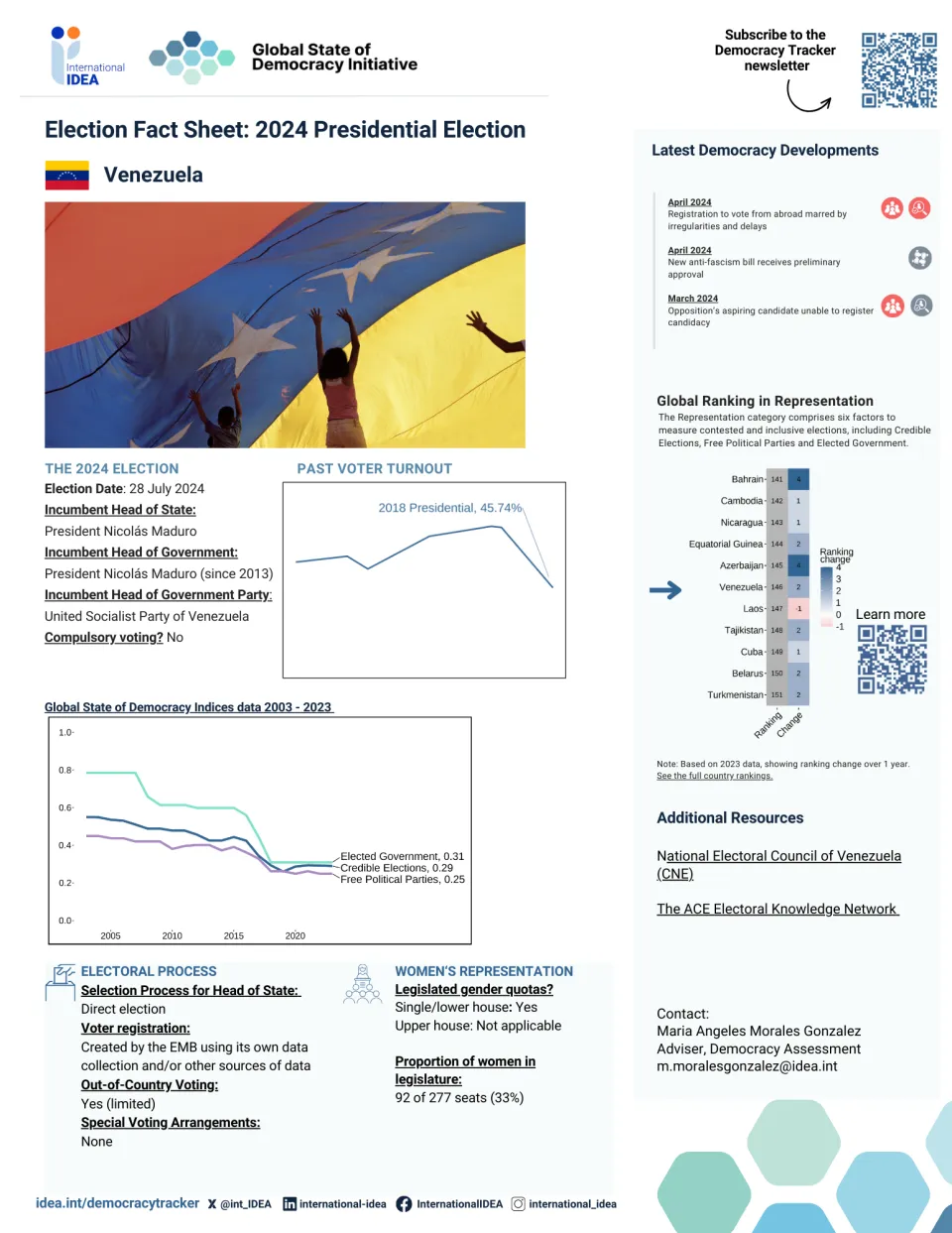
Venezuela
Venezuela exhibits low performance across all four categories of the Global State of Democracy Framework. It is among the bottom 25 per cent of countries regarding most indicators. Between 2019 and 2024, Venezuela has experienced significant decline in Effective Parliament and Economic Equality. Venezuela’s economy relies primarily on the oil industry. Although it possesses the largest oil reserves in the world, misuse of revenues has led to a decline in oil output. Additionally, dependence on oil has left Venezuela vulnerable to oscillations in commodity prices.
In the 1980s, social discontent followed the adoption of IMF-recommended liberalizing policies, resulting in a considerable increase in the price of fuel and public transportation. Instability culminated in two coup attempts in the early 1990s and launched Hugo Chavez into power in 1998. His “Bolivarian Revolution” prioritized nationalism and social welfare. Chavez also led the drafting of a new constitution, which allowed him to rule by decree, end term limits, restrict the work of independent media, and virtually take control of the Supreme Court. Chavez died in 2013.
In 2014, a drop in the international price of oil led to Venezuela’s economic collapse with devastating social impacts. Social unrest descended into mass protests in 2014 and 2017, which were met with violent government crackdown. The contested (and fraudulent) elections of 2018 divided the country. Since 2019, Nicolas Maduro’s government has taken violent measures to repress adversaries, which international experts have described as crimes against humanity. In 2024, the government and electoral authorities failed to establish conditions for credible elections: the opposition faced multiple hurdles to nominate a candidate; voters faced restrictions as well. Results lacked transparency, and the Maduro-friendly electoral body proclaimed him winner, sparking massive protests that were violently repressed. The opposition’s Unitary Platform claimed victory, recognized by several actors, and its candidate, was forced to flee after an arrest warrant was issued against him.
Venezuela’s constitutional framework prohibits sex-based discrimination. However, the prevalence of gender-based violence and trafficking of women and girls are significant challenges, as are women’s access to sexual and reproductive health. Abortion is criminalized in all cases except when the mother’s health is at risk, and severe restrictions impede access to adequate care. LGBTI people also continue to be victims of violence, while same-sex marriage remains prohibited.
According to 2011 government data, most of the population self identifies as either Brown-skinned (“Moreno”) or White, with Black and Indigenous minorities. The constitution and other legal provisions recognize the multiethnic and multicultural character of the nation; however, racial minorities are particularly impacted by poverty. Extractive activity and lack of legal recognition to ancestral land rights have resulted in the internal displacement and migration of thousands of Indigenous persons. The country’s economic and political crisis has resulted in more than eight million emigrants, who have mainly settled in Colombia, Peru and the United States.
Going forward, it will be important to watch performance in Rights, particularly Civil Liberties, as restrictions on protests against the government and arbitrary detentions have increased. As Venezuela grows increasingly isolated, Economic Equality should be followed as well, as an already declining performance could be further impacted by potential economic sanctions. The government’s refusal to engage in dialogue with the opposition will continue to impact Representation scores, as Rule of Law continues its downward trajectory.
Last Updated: July 2025
https://www.idea.int/democracytracker/
October 2025
Maduro to expand surveillance through citizen-reporting app
Nicolás Maduro has instructed the armed forces to either adapt an existing app or develop a new one within the same system, with the aim of enabling Venezuelans to report suspicious activity among their peers. Originally designed to allow citizens to flag problems with public services, the VenApp platform was repurposed during the protests following the 2024 election, when some users began reporting Maduro critics. This signals an escalation in surveillance efforts as the prospect of U.S. military action against Venezuela grows, with the U.S continuing to strike boats off the coast of Venezuela and following President Trump’s authorization of covert CIA activity in the country.
Sources: CNN, France 24, Infobae, Los Angeles Times, Time
Maduro asks Supreme Court to revoke nationality of opposition members

Nicolas Maduro has petitioned the Supreme Court to revoke the nationality of Venezuelans who have expressed support for a potential invasion by the United States. He added that their passports and other documentation would be cancelled by the government. Although the Constitution expressly states that the nationality of Venezuelans by birth cannot be revoked, Maduro based his petition on a provision of the Constitution that establishes the duty to defend country, sovereignty and territorial integrity. Maduro has specifically targeted opposition members Leopoldo Lopez and Yon Goicoechea for their statements in favour of an armed intervention by the United States.
Sources: DW, El Mundo, El Pais, La Republica, AP News
May 2025
Elections are held for legislature and regional governments

On 25 May, Venezuela held elections to choose National Assembly deputies, local lawmakers and regional governments. According to the National Electoral Council, the ruling party (Simon Bolivar Great Patriotic Pole) attained 82.6 per cent of votes for parliament, and 23 out of 24 governorships. Notably, ballots included options for the election of government in the Essequibo, an area over which Guyana and Venezuela have had disputes in recent years (and over which a majority in the international community recognize Guyanese sovereignty). The Electoral Council estimated voter turnout to be around 42.6 per cent (an increase from 30.5 per cent from the last parliamentary elections of 2020). The opposition disputes the data and claims absenteeism was around 85 per cent. Five of the elected governors were women; official data on the number of women winning seats in the legislature is pending. No independent international electoral observation missions were present for election.
Sources: BBC, The Guardian, France 24, El Pais
November 2024
National Assembly criminalizes support of international sanctions
The National Assembly unanimously approved legislation known as the Simón Bolívar Law, which will criminalize any support or calls for international sanctions against the government of Nicolás Maduro. It was promulgated on 29 November. People in any way involved with promoting international sanctions against Venezuela will face punishment of up to 30 years imprisonment and up to one million euros in fines. The legislation also classifies international sanctions as crimes against humanity and establishes a national registry of people who are alleged to have taken part in promoting sanctions, who could face other measures such as having their assets frozen or, in the case of foreigners, being expelled from the country. Earlier in November, prosecutors announced an investigation into Maria Corina Machado, leader of the opposition, for treason, for allegedly supporting new U.S. sanctions on Venezuela.
Sources: France 24, BBC, El Pais (1), El Pais (2), Asamblea Nacional
August 2024
Repression of anti-Maduro protests and opposition intensifies
At least 24 people have been killed, many injured and thousands arrested in the context of protests against the unsubstantiated claims that Nicolas Maduro was reelected in the 28 July election. Some of those detained have been charged with crimes of terrorism and inciting hatred. Opposition candidate Edmundo Gonzalez Urrutia was forced to flee Venezuela in early September after an arrest warrant was issued against him. Other prominent opposition politicians have also been arrested. In this context, the government suspended the operation of social media platform X for ten days. Reprisals against members of the press and dissidents have been such, that groups of journalists have opted to disseminate the news through AI-created avatars.
Vote tallies collected by opposition observers appear to support the Unitary Front’s assertion of an opposition victory. However, the regime-friendly Supreme Court has sided with Maduro and confirmed his re-election claims.
Sources: DW, Infobae, El Universo, The Guardian,
See all event reports for this country
Global ranking per category of democratic performance in 2024
Basic Information
Human Rights Treaties
Performance by category over the last 6 months
Blogs
Election factsheets
Global State of Democracy Indices
Hover over the trend lines to see the exact data points across the years
Factors of Democratic Performance Over Time
Use the slider below to see how democratic performance has changed over time

